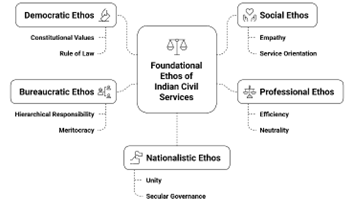THE APPROACH
Introduction: Begin by framing the civil services as a constitutional institution rooted in both professionalism and national service, as envisioned by leaders like Sardar Patel. Highlight their role as not just administrators but as custodians of unity and democratic values.
The Body
1. Foundational Ethos of Indian Civil Services: Outline key values and emphasize their role in upholding the Constitution and fostering national integration.
2. Application of Ethos in Diverse Governance Contexts
-
-
- Secularism – maintaining communal harmony (e.g., Bahraich 2024)
- Communalism – resisting polarization, upholding rule of law
- Regionalism/Ethnic Conflict – neutral governance in conflict zones (e.g., Manipur)
- Law & Order – ethical, efficient responses to violence and unrest (e.g., Bihar)
-
3. Significance of the Ethos Today
-
-
- Stress the civil service’s role in preserving national unity, protecting minorities, and ensuring constitutional governance amidst rising social tensions.
-
Conclusion: Conclude by reaffirming that the ethos of civil services is a fusion of competence and national commitment, vital for safeguarding India’s pluralistic fabric. Emphasize their evolving role as architects of a just, united, and inclusive nation.
Introduction:
Civil services in India, as envisioned by the Constitution and leaders like Sardar Vallabhbhai Patel, are not just administrative bodies but key pillars of national unity and democratic governance. They embody professional competence, ethical integrity, and a strong sense of national service. This blend of expertise and constitutional commitment positions civil servants as guardians of unity, integrity, and fraternity in India’s diverse society.
Body
Foundational Ethos of Indian Civil Services: The foundational ethos of Indian civil services—democratic, social, professional, bureaucratic, and nationalistic—collectively guide administrators in balancing efficiency with empathy. These values ensure impartial governance, uphold constitutional principles, and promote national integration, making civil servants not just policy executors but key agents of unity, integrity, and inclusive development.

The synergy of professionalism and nationalistic consciousness enables civil servants to function as pillars of national integration in India’s diverse socio-political landscape. This alignment finds practical application in how they uphold secularism, resist communalism, and counter regionalism.
| Theme | Role of Civil Services | Ethos Reflected | Examples & Data (2023–2025) |
|---|---|---|---|
| Secularism | Ensuring constitutional neutrality and communal harmony during religious tensions or riots. | Professionalism; Nationalistic Consciousness | In Bahraich (Oct 2024) communal violence (Hindu Muslim), administration-imposed curfews, restored internet in 4 days, halted demolition notices, showcasing law enforcement and impartial action |
| Communalism | Bordering on hate speech, civil servants enforce laws impartially and uphold constitutional morality. | Moral Courage; Professional Duty | Despite 84% rise in communal riots civil services-maintained law enforcement integrity. |
| Regionalism / Ethnic Conflict | Serving as stabilizers in ethnically polarized zones through neutral, objective governance. | Nationalistic Ethos; Objectivity | In Manipur (2023–2025) ethnic clashes between Meitei and Kuki AIS officers faced ethical dilemmas and psychological stress due to community pressures but they upheld the Nationalistic ideals. |
| Law & Order Operations | Maintaining peace during or post riots via arrests, seizures, and preventive action. | Bureaucratic Ethos; Professionalism | In Bihar (Jan–July 2025), police made 5,059 arrests related to communal violence and mob attacks; seized 2,369 weapons, processed nearly 30,000 grievances, and maintained peaceful conduct of festivals. |
The government has also launched Mission Karmayogi under the NPCSCB, aiming to build a citizen centric, role-based bureaucracy rooted in values like Sewa, Sankalp, and Samarpan. As of August 2025, 1.26 crore civil servants registered on the iGOT platform, completing 3.8 crore courses, signaling strong institutional commitment to ethical and professional renewal.
The ethos of the Indian civil service is a blend of professionalism and nationalistic consciousness, crucial for governing a diverse, pluralistic society. Professional values—neutrality, efficiency, and accountability—help uphold constitutional principles, while a sense of national duty promotes unity, secularism, and inclusion.
This balance is exemplified by the Prime Minister’s Awards for Excellence in Public Administration (2025):
-
- Tarit Kanti Chakma (DM, Gomati, Tripura): Led large-scale welfare efforts—4,500+ child vaccinations, 3.8 lakh Ayushman cards, 22,000+ PMAY houses, and Poshan Abhiyan coverage for 3.2 lakh people.
- Swapneel Paul (IAS, Tinsukia, Assam): Created Assam’s first multimodal learning centre, expanding digital access and inclusive education.
- Ayushi Sudan (DC, Kupwara, J&K): Delivered healthcare through free AYUSH camps and introduced STEM labs in remote schools.
These officers demonstrate how civil servants can integrate equitable service delivery with national development goals, reflecting the core ethos of Indian administration.
Conclusion:
As Prime Minister has aptly stated on Civil Services Day 2024, “Civil servants are not just executors of policy but architects of the nation’s destiny.” Their continued ethical strength and institutional resilience remain crucial to preserving the idea of India—inclusive, united, and just.
Spread the Word
